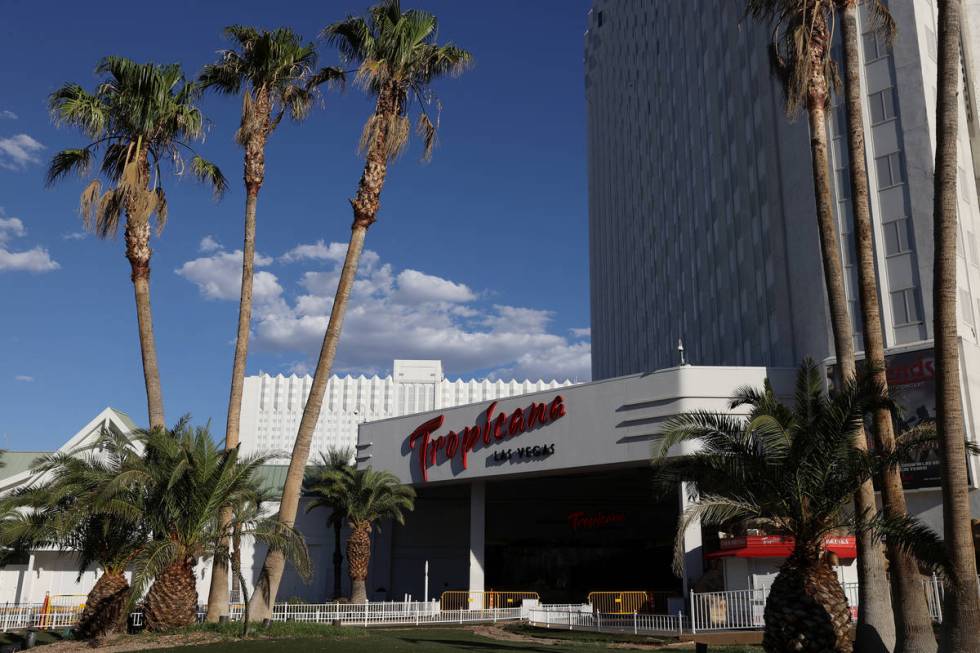Bally’s sees long-term potential in Tropicana purchase

Bally’s Corp.’s spending spree has no end in sight.
The Providence, Rhode Island-based company, which purchased the brand name from Caesars Entertainment Inc. last year, bought nine properties between March 2019 and April 2021. Three more pending casino purchases have yet to close, including the company’s $150 million purchase of the Strip property Tropicana’s non-land assets.
The casino purchases and various digital asset deals fall under Bally’s plans to further its omni-channel strategy, which continues to ramp up as operating environments improve.
“We are encouraged by the rate and effectiveness of vaccinations as well as the loosening of capacity restrictions and other COVID-19 protocols,” President and CEO George Papanier said during a Monday call with investors. “We are confident that we’ll continue to benefit from a strong rebound in demand.”
Opportunistic approach
The Tropicana deal is expected to close in early 2022, and was described by the company as an “economical entry” to the Las Vegas Strip market, with long-term potential upside.
“The Las Vegas Strip is the preeminent destination, visited by over 40 million players and guests every year,” Papanier said. “We are confident that this addition to our brick-and-mortar portfolio will significantly enhance our robust customer base, which includes more than 15 million connected customers, and unlocks additional marketing opportunities for us to leverage the iconic Bally’s brand.”
The $308 million transaction was made with Gaming & Leisure Properties Inc., and is Bally’s second deal with the real estate investment trust. Once it has closed, five of Bally’s properties will be leased from GLPI.
“Another recently announced (sale) near the Strip suggests our transaction is a good one,” Chief Financial Officer and Executive Vice President Stephen Capp said, likely referring to the Palms sale announced last week. “While we do remain committed to the outright ownership of a good portion of our real estate portfolio, this transaction is another example of our continuing to execute on an opportunistic basis.”
Union Gaming analyst John DeCree said Bally’s has clearly benefited from recently acquired properties, but also noted that same-store adjusted property earnings before interest, taxes, depreciation, and amortization — which measures overall financial performance — increased 80 percent year-over-year.
“The company remains committed to the operating efficiencies found throughout (the pandemic) and reiterated that it would be thoughtful as to how it reintroduces less profitable amenities,” DeCree said in a Monday note to investors.
As for future deals, Papanier said the company will continue to be opportunistic but disciplined, looking for assets that give Bally’s access to sports betting and iGaming markets. The company currently owns and operates 12 casinos in eight states, and has about $402 million in total liquidity, of which $152 million is cash on hand.
In addition to brick-and-mortar casinos, the company has acquired a handful of digital assets as part of its mission to become the first truly integrated omnichannel gaming company with a business-to-business-to-consumer business model. It recently announced plans to acquire online gaming operator Gamesys Group, the No. 1 provider of bingo and casino games in the United Kingdom.
After the acquisition, which is expected to close by the end of the year, Bally’s “will be well positioned to capitalize on significant growth opportunities in the sports betting and iGaming marketplace,” said Adi Dhandhania, Bally’s senior vice president of strategy and interactive.
As for mobile sports betting, management indicated that Bally’s sports betting app could launch in its first state, Colorado, by the end of the month, and could be live in three additional states by the end of the year.
Growing momentum
Revenue in the first quarter was $192.3 million, up 76 percent compared to the same period the year prior. Income from operations was $29.5 million, Bally’s strongest quarter since the second quarter of 2019.
Jefferies analyst David Katz said in a Monday note that the results are “solid across segments given the uneven recovery,” and reflect strong margin performance across the gaming industry.
Papanier said the positive results were driven by the vaccine rollout, loosening operating restrictions and limited entertainment options. He continues to see potential upsides, knowing customer groups like those in the 65-and-older demographic have seen strong rebounds but have yet to fully return.
“As we continue to safely welcome our customers back at our facilities, we believe we can return to pre-COVID levels in short order,” Papanier said.
Bally’s shares closed down 5.3 percent Monday at $55.17 on the New York Stock Exchange.
Contact Bailey Schulz at bschulz@reviewjournal.com. Follow @bailey_schulz on Twitter.